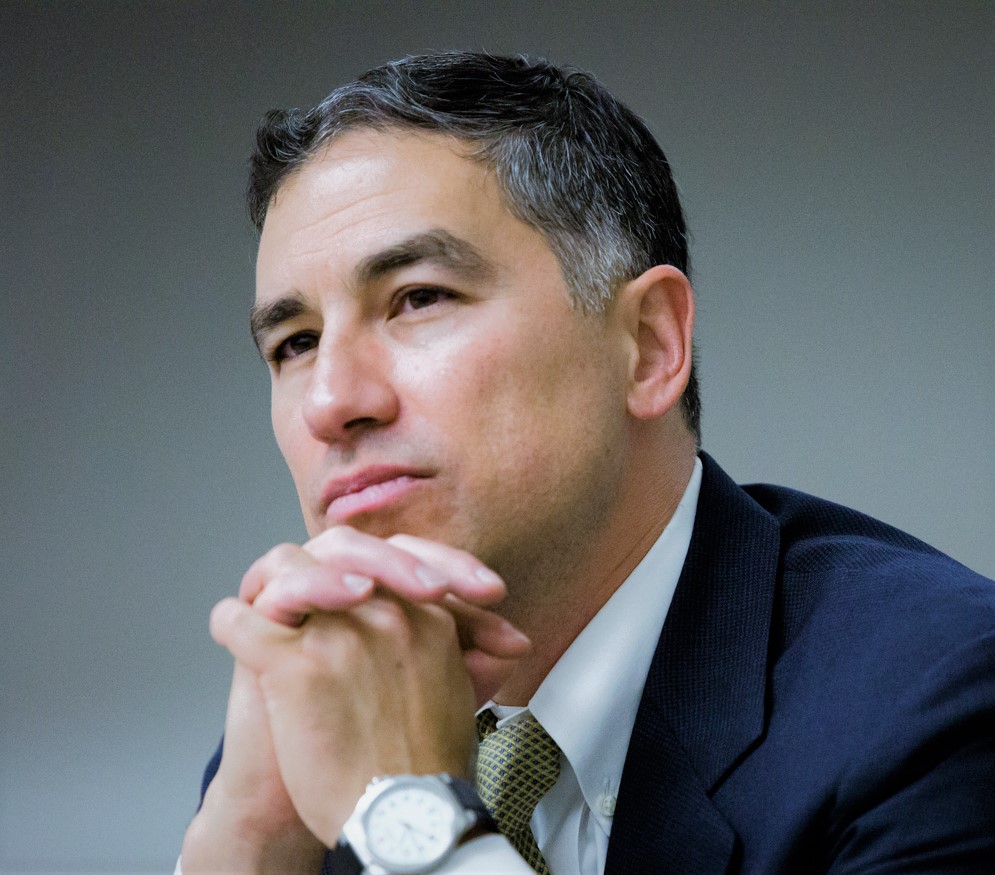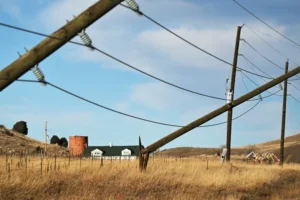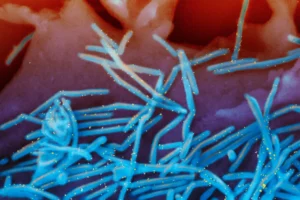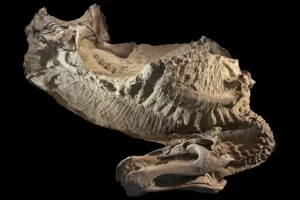New Novel from the publisher of the Wyoming Truth: Whispered Word Explores the Dark Side of Wrongful Convictions and the Secrets That Bind Us
- Published In: Other News & Features
- Last Updated: Jan 14, 2025

Editor’s note: In a world where justice often feels elusive, Whispered Word, the latest novel by acclaimed author Alec Klein, offers a gripping exploration of wrongful convictions, lost hope and the powerful pursuit of redemption. At its heart, this fictional Christian thriller delves into the fragility of faith and the relentless search for truth in a world filled with lies.
The story follows Joe, a disillusioned investigative reporter drowning in personal demons—alcohol, prescription drugs and the weight of a past he can’t outrun. His bleak routine takes an unexpected turn when he begins to hear a mysterious voice, whispering three words: “Look. Go. Seek.”
These whispers lead Joe to the case of Maggie, a woman serving time for child neglect—a crime she swears she didn’t commit. For years, Maggie has maintained her innocence, but no one has listened. Spurred on by the voice—and by a growing sense that something greater is at work—Joe sets out to uncover the truth. He journeys across the country, from New York to Oklahoma, a small Texas border town, and finally, the remote countryside of Mexico, where he begins to unravel a conspiracy larger than he could have ever imagined.
The following is an exclusive excerpt from the novel, set to be published on January 28, by Beaufort Books.

I didn’t know she was there, waiting for me to find her in prison.
This was before I discovered her existence, before all the confusion and dead ends and blood and death would come crashing down.
This was in the quiet interlude when I was still popping pills and drinking hard, yearning for the bubbling concoction to put a merciful end to me in a willowy landing, terminating the swirling thoughts dosing in on my miserable self, the broken remnants of my attenuated life, the wreckage of my stifling insignificance.
Minute number one of the rest of my life: I stumbled out of a dive bar, lurching forward to nowhere in particular. Teetering, I stared hard at the gray cement sidewalk before me, seeking to divine the meaning in the cracks. But the fractured view was of my anguish, the loss, the lack of conviction.
Even in my numbed state of inebriation, I couldn’t escape myself.
Yes, I wanted to die.
Not actively, though. That would take effort. I was afflicted with a lack of will, the disease of not wanting to be anymore.
Because there was no point, not anymore, not after what had happened.
“Look.”
I lifted my addled head, seeking the source of that whispered word. I detected nothing, except myself, alone, situated on a forlorn spot of Ninety-Ninth Street and Amsterdam Avenue on the Upper West Side, under the dim pool of half-burnt streetlight.
New York City, in silent repose: all grime, hard edges, and towering anonymity in the predawn hours of a day without meaning.
A siren blared in the distance. I must’ve imagined the voice. Maybe it had been my own. Perhaps, I had just been talking to myself without realizing it. Or could it have been a monologue in my mind, the wanderings of a madman on the precipice?
I banished the unsettling question. It didn’t matter. I had no intention of listening to the voice-whatever it was, whoever it was, whether it was. There was nothing to look at, anyway. Virtually everything, after all, had just been obliterated: My job. My income. My reputation. My career. My peers. My friends. My family. My ability to move about freely, unburdened. My mirth. My lightness of being. Hadn’t laughed. Gone was this too: any future.
What remained was about to slip from my grasp as well: My apartment, the fortress of solitude. The last refuge of my credit card. My sense of self, most of all. I couldn’t even feel my face.
All that would stay behind was the indelible stain of shame.
More to the point: Disgrace.
Not that it was relevant now. All that required my attention was the exigencies of the moment, placing one precarious foot in front of another. I thought I could manage it well enough, being practiced in the art of moving without making progress.
But I underestimated the gravitational pull of half a dozen shots of cheap vodka and the deleterious effects of generic Xanax, which canted me forward until I tumbled into a garbage can.
Just as well.
My fall into putrid waste was witnessed by no one; therefore, it didn’t happen. That was the extent of my distorted logic.
Sprawled on my back, legs spread wide, I figured I could camp out here by the garbage can, slumped on the sidewalk for a while, wallowing with my ever-present companion, misery, encompassed by the detritus of others: an empty paper cup, stale French bread, and the Herald, crumpled.
So, we meet again.
The tabloid confronted me with the ennui of a familiar foe, and yet something was a bit off. Was it the font? Something infinitesimal about the blaring headlines? Or just my sloshed perspective?
Being in no rush, with nowhere to go, I shook the paper, straightening out the sheets, leafing randomly to page twenty-seven.
A dollop of blood dripped from my temple-must’ve hit my head-splotching a news brief But I could still read the blurry headline:
MOM GETS 20Y FOR CHILD NEGLECT
Twenty years?
My head was spinning, such that I wondered whether I had read the headline right. Twenty years seemed like an especially long prison sentence. Couldn’t help myself, the habit of the persistent questions of my dearly departed occupation as
a veteran investigative reporter. With nothing to investigate. Not anymore.
In all my years, I’d probed cases where the accused got twenty years for worse. Much worse. Murder, for one. Even child abuse.
But child neglect?
Not that it was an excusable offense. It wasn’t. I was-let’s face it-neglected as a child. Or the opposite: I received too much attention. Beaten every so often. With a leather belt with the fangs of a metal buckle. With the fury of a verbal tirade that felt like it would never cease. No one went to prison for what was inflicted. I just got sent to a corner to ponder what I had done wrong to deserve to be showered with such attention.
Experience suggested this particular case, the one in the news brief, must’ve involved a heinous crime lacking nuance. Or maybe it was just the result of bad lawyering.
Or both.
Suddenly, I felt mildly sober. A dawning: Less than thirty minutes had transpired since I nosedived out of the dive bar. Sitting up in a pile of refuse and stench, grasping for details, I scanned the rest of the newspaper blurb.
Blah, blah, blah.
There.
No one witnessed any harm come to the child. The infant suffered internal head injuries. No forensic evidence was recovered linking the accused, the mother, to the crime. She was 21 years old. Named Maggie somebody or other. It happened in Oklahoma.
Ah.
Well, that explained it. If there was ever a place where you didn’t want to be accused of a crime, it was Oklahoma, the most notorious state for locking you up and throwing away the key. Or so I’d learned after years of investigating wrongful convictions.
Even as an oblivious New Yorker, aware only of the perimeter of the island of Manhattan as the known universe, I knew Oklahoma owned the highest incarceration rate in the nation.
Women in particular were at risk in Oklahoma, imprisoned at double the national rate. But that’s all I knew about Oklahoma. A statistic or two. Never been there. Never wore cowboy boots. Never heard of.-where’d this alleged crime occur?-some town called Skiatook.
Skiatook?
Might as well have been the moon. Besides, the news brief left too many questions unanswered. What, for instance, was the condition of the child? Apparently, she was a little girl. Unnamed. Did she survive? Was she okay? Had she recovered? And who was the ex-boyfriend of the accused, some guy referenced only tangentially? He was never charged with anything. Why not? One other thing stood out: The mom, whoever she was, said she had rushed her child to the ER. Maggie always maintained her innocence.
Always.
My mind, reflexively tapering to a focused point, recognized the import of that throwaway line in the newspaper brief. I was cognizant of the studies. I knew of the red flags. When people maintained they were innocent from the beginning, never wavering in their account, there was a chance they were telling the truth. They might have been wrongfully accused. Maggie could actually be innocent.
A pinch in my side brought me back to myself. An empty can of tuna fish in the garbage spewed around me was pressing against my hip. I dislodged the oily can, becoming acutely aware of myself.
I was too still. It was too quiet. I let out a soft sigh. Only in the den of iniquity that was New York City could you make yourself at home in the squalor of a tipped-over garbage can on a street corner without drawing any attention to yourself.
That’s when I noticed it, the date in the upper right hand corner of the newspaper still resting in my hands: November 11, 2011.
Despite being deeply under the influence, I managed to translate the date into digits:
11/11/11
Perfect symmetry. Probably meant nothing, just a little quirk marked on the calendar once a century. Which made no sense. This was-what?-2021, not 2011. Right? So, what was an old tabloid doing here, a decade later? There was no way this newspaper could’ve been sitting in the garbage can for that many years. Even New York’s dysfunctional sanitation department didn’t allow for such a remote possibility. Could someone have collected old newspapers for reasons unknown and, ten years later, just disposed of one?
Ah, I don’t need this.
In New York? Sure. In a bubbling mess of a metropolis where, the other day, I had witnessed a shaved-headed man walking on all fours, on a leash, wearing a studded dog collar, being led by a black latex-covered dominatrix in six-inch heels, anything was possible.
One thing, though, wasn’t. There was nothing I could do about this decade-old case. There was nothing I could do for—what was her name? Yes, Maggie, even if she were innocent. And my investigative reporter’s antennae told me there was more to what was likely a baroque tale.
It was too late. She had already been convicted. A lifetime ago. Meaning, she was now about thirty-one years old, not much younger than I, and she wasn’t just institutionalized; she had likely exhausted all of her legal appeals. The only thing
left for Maggie to do was to bide her time until it was up, another interminable decade of mind-numbing, bone-crushing incarceration.
That I had come across Maggie’s case was nothing more than geographical circumstance: me careening into a garbage can. A coincidence.
That’s what I told myself, anyway.
I didn’t believe in fate, or the confluence of factors in an orderly world made unified by a power unseen. Investigating crimes of unspeakable horror had cured me of any romantic notions of the way of things in the material world. What I had just endured, in my own personal agony, only reinforced my cynicism. Bad things happen to good people. The globe twirled in asymmetrical cruelty. Nihilism ruled the roost. It was my unspoken religion-the utter contempt for one. The faithful weren’t rewarded for good deeds. The depraved could just as easily lead the gilded life and did. It was, I believed, all random.
I was, lest it be overlooked, out of the business anyway. I wasn’t an investigative reporter anymore. I wasn’t anything. Not anymore.
I shut my mind to the case of Maggie. Skiatook was just an abstraction. I couldn’t fathom it. It meant nothing. There were too many Skiatooks out there anyway. I couldn’t do anything about them. They would always be there, unresolved, unrepentant,
unmitigated.
I threw down the tattered newspaper. Let it be. Leave it alone. The leaves of the frayed pages flapped in the summertime breeze.
Let someone else deal with it. I was, as I always felt, and what’s more—suspected, nothing. At all. Wait. Was that a non sequitur?
Realization: Not more than an hour had passed since I’d stumbled out of the neighborhood bar, which felt like a split second or a lifetime. As I crawled my way out of a morass of filth, I girded myself for the arduous task before me, if it could be done. There was only one thing left to do: Find my way home.
You can find the book on Amazon here:













